American Pride
The Dionysian energy and Apollonian creativity of the American Project to go beyond conformist dogmatism.
Rebelling Against the New Conservatism
In the United States, we dreamed of flying cars and conquering the stars, but found ourselves in a world whose main cultural preoccupation appears to be that of color coded identities as a stand in for any sort of achievement.
But the rejection of this “civilizational consolation prize” has been increasing within our educational institutions, such as in the town of Burlington, Massachusetts which received a reaction of this sort to the start of Pride Month at Marshall Simonds Middle School back on June 2.
The school’s Spirit Day celebrating Pride was met with students tearing down rainbow flag decorations and chanting “U.S.A are my pronouns” while clad in red white and blue colors, standing opposed to what has been the rainbow colored dominant culture within many schools for some time now. While more details are needed to get the full picture, signs do not point to this being Pride of the “live and let live” focus on humanistic tolerance, but what has been all too common lately in schools as a political weaponization of Pride for promoting gender ideology.
There were accusations of being coerced into participating in the Pride event as stated by the mother of one student, Christine Steiner:
“Some of the kids threw the stickers on the ground. But I can only speak for my daughter, she just didn’t want to wear that to school. It’s not that she wanted to hurt anybody’s feelings,”
Her daughter also expressed discomfort with a poster at the school which stated: “What is straight? A line can be straight, or a street, but the human heart, oh, no, it’s curved like a road through the mountains.”, something that would not likely pass Karl Popper’s paradox of tolerance since being a standalone poster, its been weaponized out of its original intent of conveying emotional complexity in Tennessee Williams’ “A Streetcar Named Desire”.
School faculty and some of the parents saw this anti Pride protest as an attack on the most vulnerable, and unfortunately with the culture war heating up, this may very well be the case. But it is important to see what would have led to such a feeling of vulnerability in the first place, and what the contrasting energy of the protesting middle schoolers is pointing towards.
In a recent piece for FAIR (Foundation Against Intolerance and Racism) Julian Adorney and Mark Johnson discuss the spiritually destructive “Tribe of One” mentality stemming from leftist identity politics which reduces the individual to a series of immutable characteristics. This contributes to loneliness and poor mental health as it isolates the ego being from a shared sense of humanity but not so for young conservatives who seem to have a better connection to family and community as studies have shown.
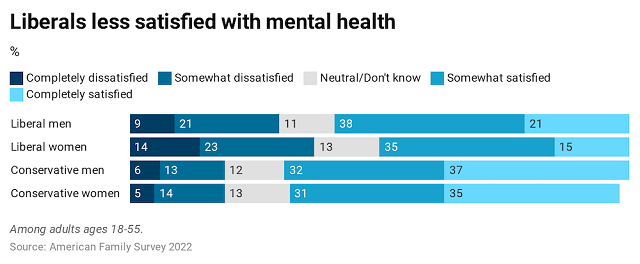
Focusing on such connections and the lack thereof gives us some motivations at play in the middle school, as one group of kids is protesting against what they see is a denigration of their values veiled in tolerance, while the other group has been convinced of how vulnerable they are to discrimination through their education system and social media. But there is a factor to consider for both sides which has been missing from the conversation with regards to the question of “what for?”.
The conservative students’ proclamation of U.S.A. being their pronoun, while intended to make fun of pronoun policing, contains a longing for more than just a well intact family and community or integration with common humanity. It is the longing for a fiery and dare I say “prideful” energy of accomplishing something earth shattering which is very much an American quality, but not a conservative let alone Christian one.
By contrast, students who take their preferred pronouns and identity seriously are in a way more conservative as they’re mired within an unquestioning fatalism and victimhood caste system, while the pushback against this from classic liberals and more traditionally oriented people is like a mini American Revolution against this prevailing orthodoxy.
This doesn’t mean that religious traditionalists should take control so their theocracy takes the place of our current one, but that yearning for freedom itself should be taken note of by these traditionalists as an indispensable ingredient for what the Founding Fathers wanted to accomplish. Even more importantly, sharing in the energy of overcoming the dominant ideology should point many of the edgy reactionary fundamentalist zoomers beyond their orthodoxy and into the original aims of our civilization.
The Esoteric American Project
Rather than being dragged down into the conforming masses of humanity, the American project was one of rebellion against dogmatism and superstition (sorry traditionalists) in pursuit of a state based (and redpilled) in philosophy.
This does not imply a bunch of nerds in ivory towers hunched over dusty books, but a societal incubator for the development of individuals to transcend the cycles of history through the expansion of their consciousness. This aim for wisdom within a classically liberal framework of natural rights resulted in world changing discoveries and deeds which are indicative of a nature far less bashful and conformist than a purely Christian doctrine which seeks happiness in the other world.
While there’s little doubt of such high concepts being on their minds at present, the kids whose pronouns are U.S.A. certainly don’t see America as a meek nation that turns the other cheek, but a dynamic titan that refuses to comply with the ideology held in common by those who have power over them. Whether they turn such a quality into something productive or squander it through vengefully bullying the more sensitive kids is not yet known. But this dynamism is far more Promethean (in the sense of bringing enlightenment) than Christian, as can be seen within the Founding Fathers themselves.
Thomas Jefferson, John Adams, and Thomas Paine among many others rejected the literal interpretation of Christianity, seeing it as one of many mythological fables at best. Jefferson classed the birth of Jesus together “with the fable of the generation of Minerva in the brain of Jupiter”, while Adams referred to the Cross as an “engine of grief” on which he cast the blame for our post Roman stagnation. We won’t even get into Paine, but suffice it to say his views would be pretty “Paine-ful” for the faithful to hear.
Neither did the beloved George Washington mention the name of Jesus Christ even once in his private letters, and only scarcely in public. But Washington was also a Freemason along with fellow Founding Fathers Benjamin Franklin, James Monroe, John Hancock, and Paul Revere, so it was not a matter of him lacking spirituality. While welcoming of all faiths, the teachings of Freemasonry speak more towards an alchemical transmutation of the individual through cultivating wisdom rather than blind faith and subservience to something which is beyond our understanding.
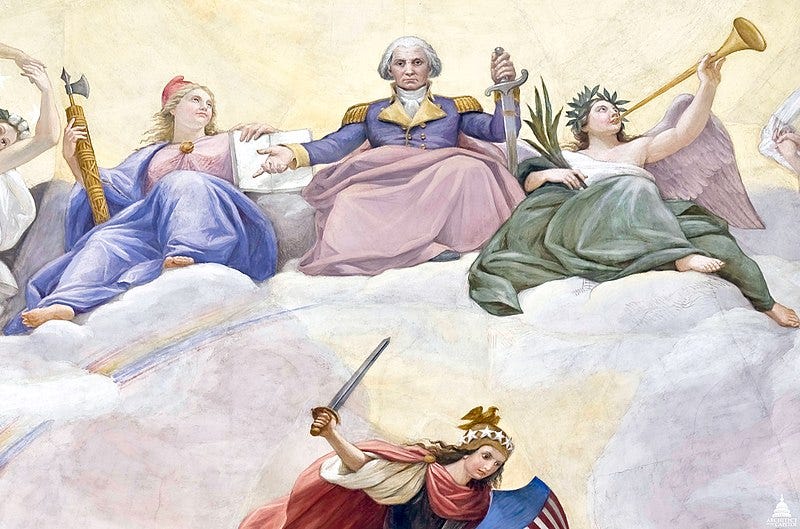
This focus on an “as above so below” understanding of mathematically harmonious structures in the pursuit of the same harmony within ourselves was the preoccupation of many secretive orders long before the Freemasons, such as in the case of the Pythagorean Order as well as Platonists, Neoplatonists, Hermeticists, Kabbalists, Sufis, and many others.
What would seem out of step with these orders at first glance though was their participation in a less harmonious force which would fit in with the energy resembling a Pride parade, this being the force of chaotic Dionysus as opposed to the mathematical and intricate Apollo.
Dionysus (known as Bacchus in Rome and Osiris in Egypt) was the dying and rising god of wine, religious ecstasy, and theater who is to be recognized within each of us as the fundamental energy behind all of creation. If the expiration of our creative breath is reflected in music, art, and architecture, then Dionysus is the inspiration.
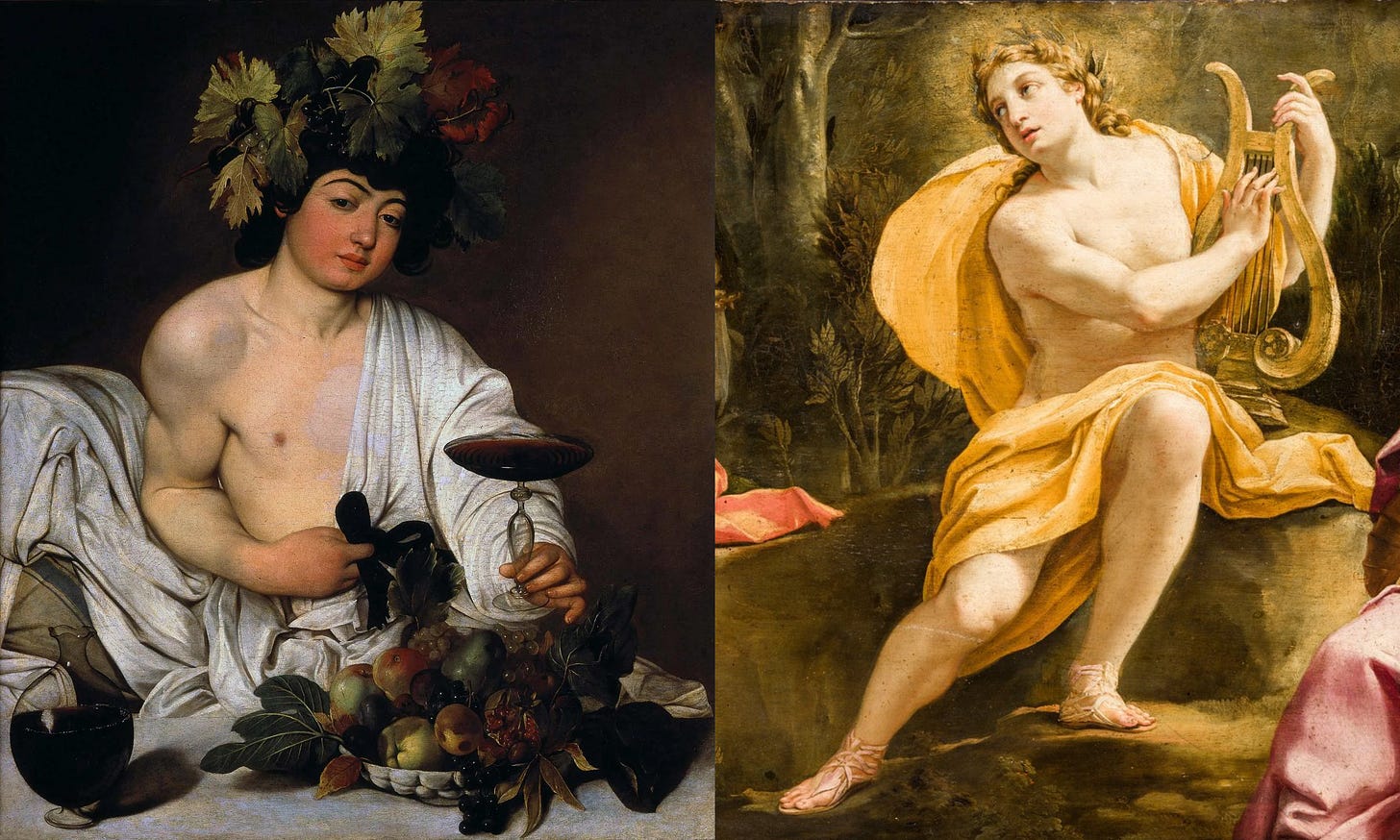
The ancients recognized the importance of this generative energy as can be seen in such works as "The Mysteries of the Egyptians, Chaldeans, and Assyrians" by Neoplatonic philosopher Iamblichus, who goes on to say the following (Section III - Chapter IX):
“That music, therefore, is of a motive nature, and is adapted to excite the affections, and that the melody of pipes produces or heals the disordered passions of the soul, changes the temperaments or dispositions of the body, and by some melodies causes a Bacchic fury, but by others occasions this fury to cease”
Iamblichus credits Bacchic initiation for those who are depressed, citing Pythagoras as the source of this wisdom, but he likewise distinguishes the divine frenzy induced by the primal energy from mere hedonistic frivolity (Section III - Chapter X):
“For all such like particulars are corporeal-formed, and are entirely separated from a divine and intellectual life. But each thing energizes conformably to its nature; so that the spirits which are excited by the Gods, and which produce in men Bacchic inspiration, expel every other human and physical motion; and it is not proper to assimilate their energies to those which are usually exerted after our manner; but it is fit to refer them to perfectly different and primordial divine causes. One species, therefore, of divine inspiration is of this kind, and is after this manner produced.”
In other words, the Dionysian rites were one of a number of mystery school traditions that featured an overturning of the established order with drinking, dancing, and revelry, but this was not indulgence for its own sake, nor had it anything in common with displays of empty hedonism.
The ecstatic mysteries were seen as a way to transcend the limitations of the ordinary self and experience a state of ecstasy or divine possession, through which one could release inhibitions, connect with primal energies, and access hidden aspects of the self and the universe.
It would make sense that to get to the higher aspects one would have to go down into the bubbling furnace of their subconscious like Dante venturing into the Inferno, so as to know oneself without allowing for this Jungian shadow to manifest unconsciously, and being able to then use this inspiration towards noble ends.
In terms of more direct connections with the Founding Fathers, 33rd Degree Freemason and mystic Manly P. Hall connected “the craft” of Masonry with the “Dionysian Artificers” responsible for building the Temple of Solomon, while the aforementioned Neoplatonist Iamblichus referenced “Sabazios” as a name for not just Dionysus but the sky-father “God” of the Jews. Syrian and Anatolian Jews to be precise, identified Sabazios with Sabaoth (Sabbath, anyone?) to the chagrin of the Roman rulers who did not want competition for their people’s attention from this “corrupting” Jewish cult of "Jupiter Sabazius”.
For more on Judaism’s connection to Dionysus, check out the video below by my friend Neal Sendlak (Gnostic Informant) who helped find the Iamblichus reference:
All this is to say that the gods were not distinctly separate tribal entities but related to each other as aspects of the whole that the seeker of wisdom strives to understand. Likewise, these higher concepts were cloaked in the dogma of their time so as to survive and make an impact in the political, scientific, and cultural sense when expressed through the works of great and influential people like the Founding Fathers.
Pride in Knowing Thyself
It could be proposed that despite this Dionysian energy of seeking greatness, the straight “U.S.A. are my pronouns” students are more closed minded than those looking beyond the gender binary, but with the aforementioned “Tribe of One” mentality of the non binaries, this is hardly the case.
It takes a well developed mind to look beyond the artifice and into the core, as was the case with those who could see beyond their organized religions, but there has been a degeneration of this development when the search for the self arrives at the premature dead end of a candy colored flag to represent one’s identity.
Even the fluidity of jumping between identities is represented by its own flag, so instead of sailing in the adventurous ocean of possibility through your deeds, you are reduced to waddling in a shallow muddy lake of this precious identity cheered on by the influencers and corporations who want your attention and money.
There is nothing to achieve and nowhere else to go.

At least with the focus on family and community in the non-identarian conservative groups, the challenge of managing relationships acts as a spiritual guide of its own. This by itself does not mean most people will (or ever have) taken the philosophical path, but they are to be well polished antennas receiving signals from those imbued with actual wisdom. At present, however, the expected trajectory is one of religious tribalization against the woke elements and further entrenchment into their respective dogmas.
This solidifying on all extremes will be fueled by one side escalating the other to respond in kind, and Pride as a movement is likely to keep going further away from the emphasis on acceptance we saw after the onset of AIDS, and more towards a festive sexuality which has its place within the aforementioned Dionysian carnival.
One big problem is when the sexual inhibitions are let loose (as they should be within the right context) it's within a corporate approved public space that families take their children to. Consequently, the right that was hard-won to be recognized as decent members of society, desiring privacy, is now subjected to scrutiny by groups who would otherwise be unconcerned about activities occurring within the confines of one's bedroom.
Less tolerance grows overtime as a result of this, and there is a legitimate fear that the pushback will target those who have no desire to parade in bondage gear around families, but whose ideal would be the sexual equivalent of being race-blind. These are the people who should be heard from more, and work to promote a pro human movement (like FAIR) which emphasizes actual tolerance for diversity.
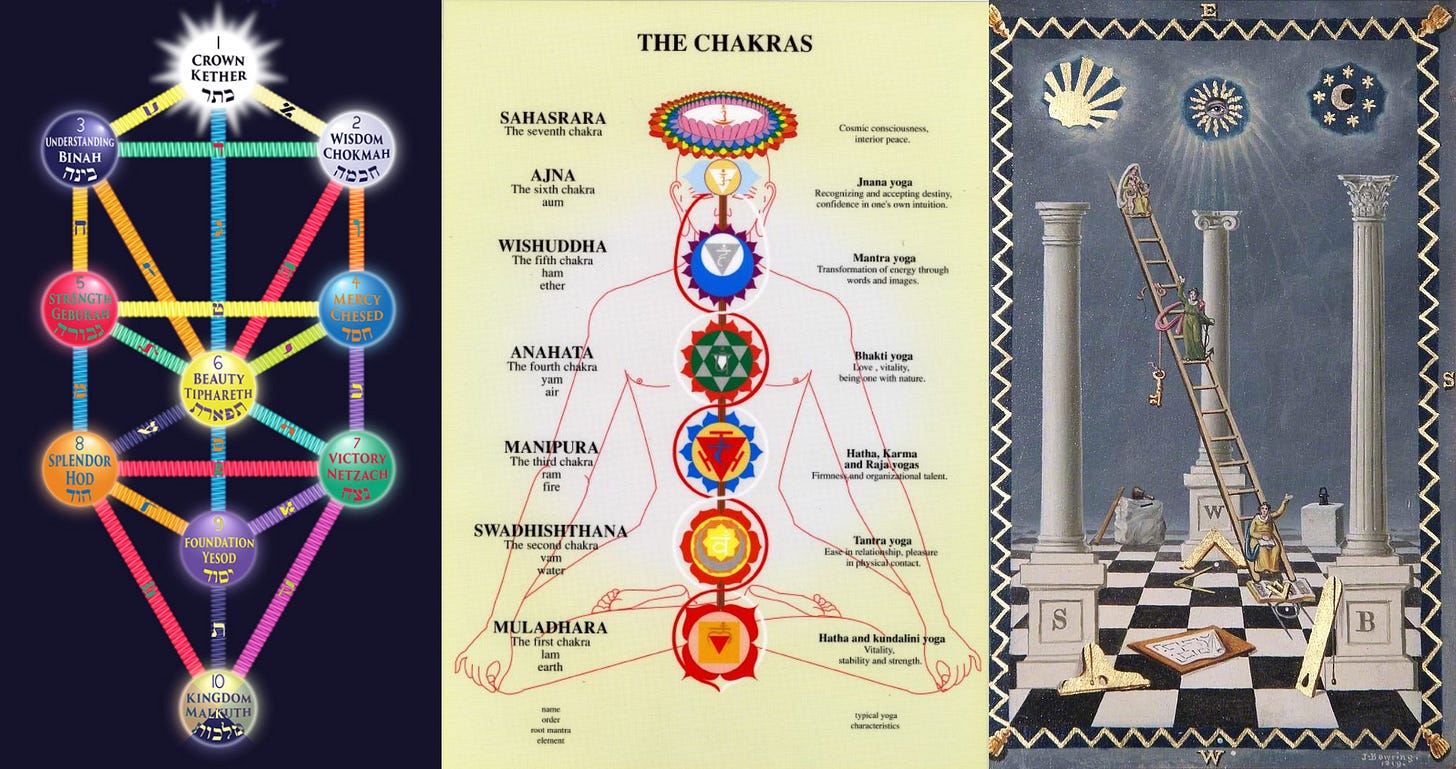
But inclusivity for its own sake leaves a power gap for the victimhood hierarchy to dominate, unless there is something higher to aim for as well, which is why along with tolerance for differences, we should embrace the original American project and incubate not individualism as it is, but individualism with the emphasis of human “becoming” rather than human “being”.
This focus will not just lift up our greatest future minds, but have their accomplishments act as an attractor for others to emulate in the pursuit of greatness in the philosophical sense. And they in turn will reflect on the behavior of society at large so that we see a way out of our current societal predicaments.
Whatever the next goal of humanity will be, it certainly is not the evolutionary dead end of candy colored identities backed up with sanitized corporate affirmation. It will be to break through the pressure we recognize today and use the primal Dyonesian birth pangs of whichever adversity comes our way to lift ourselves beyond it.


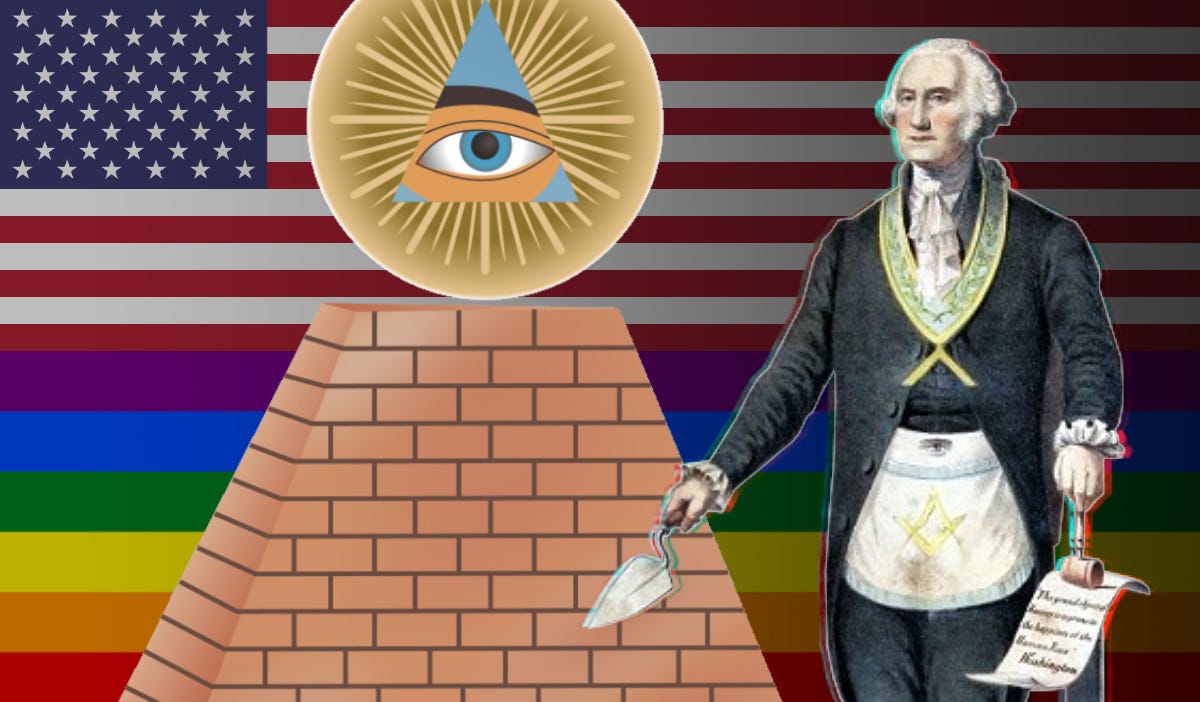
Truly great read.
Well done